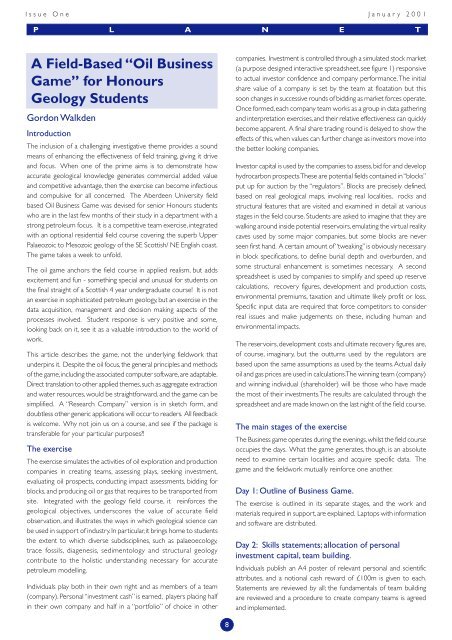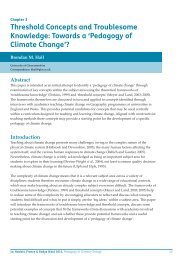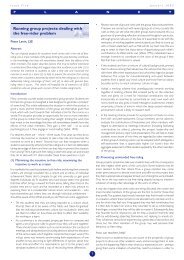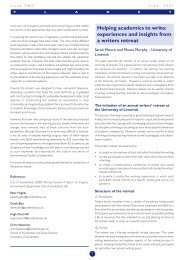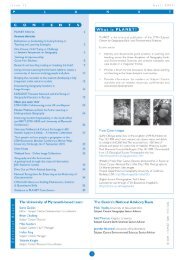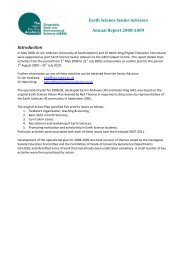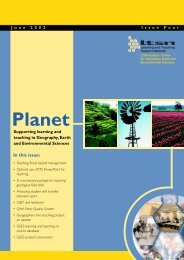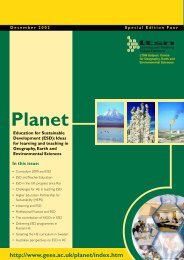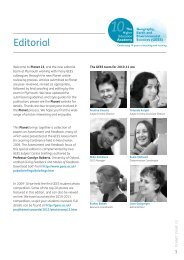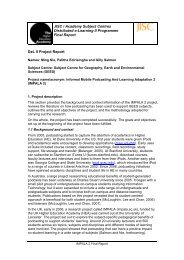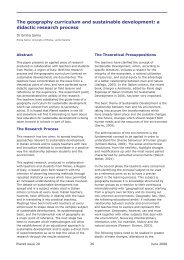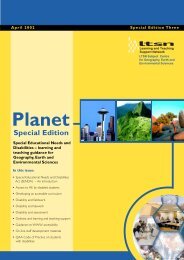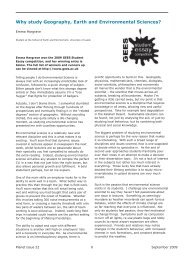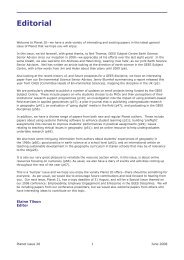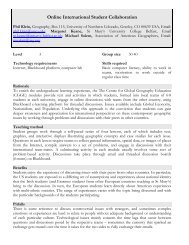Download this PDF - GEES Subject Centre Home
Download this PDF - GEES Subject Centre Home
Download this PDF - GEES Subject Centre Home
You also want an ePaper? Increase the reach of your titles
YUMPU automatically turns print PDFs into web optimized ePapers that Google loves.
Issue One January 2001<br />
P L A N E T<br />
A Field-Based “Oil Business<br />
Game” for Honours<br />
Geology Students<br />
Gordon Walkden<br />
Introduction<br />
The inclusion of a challenging investigative theme provides a sound<br />
means of enhancing the effectiveness of field training, giving it drive<br />
and focus. When one of the prime aims is to demonstrate how<br />
accurate geological knowledge generates commercial added value<br />
and competitive advantage, then the exercise can become infectious<br />
and compulsive for all concerned. The Aberdeen University field<br />
based Oil Business Game was devised for senior Honours students<br />
who are in the last few months of their study in a department with a<br />
strong petroleum focus. It is a competitive team exercise, integrated<br />
with an optional residential field course covering the superb Upper<br />
Palaeozoic to Mesozoic geology of the SE Scottish/ NE English coast.<br />
The game takes a week to unfold.<br />
The oil game anchors the field course in applied realism, but adds<br />
excitement and fun - something special and unusual for students on<br />
the final straight of a Scottish 4 year undergraduate course! It is not<br />
an exercise in sophisticated petroleum geology, but an exercise in the<br />
data acquisition, management and decision making aspects of the<br />
processes involved. Student response is very positive and some,<br />
looking back on it, see it as a valuable introduction to the world of<br />
work.<br />
This article describes the game, not the underlying fieldwork that<br />
underpins it. Despite the oil focus, the general principles and methods<br />
of the game, including the associated computer software, are adaptable.<br />
Direct translation to other applied themes, such as aggregate extraction<br />
and water resources, would be straightforward, and the game can be<br />
simplified. A “Research Company” version is in sketch form, and<br />
doubtless other generic applications will occur to readers. All feedback<br />
is welcome. Why not join us on a course, and see if the package is<br />
transferable for your particular purposes?!<br />
The exercise<br />
The exercise simulates the activities of oil exploration and production<br />
companies in creating teams, assessing plays, seeking investment,<br />
evaluating oil prospects, conducting impact assessments, bidding for<br />
blocks, and producing oil or gas that requires to be transported from<br />
site. Integrated with the geology field course, it reinforces the<br />
geological objectives, underscores the value of accurate field<br />
observation, and illustrates the ways in which geological science can<br />
be used in support of industry. In particular, it brings home to students<br />
the extent to which diverse subdisciplines, such as palaeoecology,<br />
trace fossils, diagenesis, sedimentology and structural geology<br />
contribute to the holistic understanding necessary for accurate<br />
petroleum modelling.<br />
Individuals play both in their own right and as members of a team<br />
(company). Personal “investment cash” is earned, players placing half<br />
in their own company and half in a “portfolio” of choice in other<br />
companies. Investment is controlled through a simulated stock market<br />
(a purpose designed interactive spreadsheet, see figure 1) responsive<br />
to actual investor confidence and company performance. The initial<br />
share value of a company is set by the team at floatation but <strong>this</strong><br />
soon changes in successive rounds of bidding as market forces operate.<br />
Once formed, each company team works as a group in data gathering<br />
and interpretation exercises, and their relative effectiveness can quickly<br />
become apparent. A final share trading round is delayed to show the<br />
effects of <strong>this</strong>, when values can further change as investors move into<br />
the better looking companies.<br />
Investor capital is used by the companies to assess, bid for and develop<br />
hydrocarbon prospects. These are potential fields contained in “blocks”<br />
put up for auction by the “regulators”. Blocks are precisely defined,<br />
based on real geological maps, involving real localities, rocks and<br />
structural features that are visited and examined in detail at various<br />
stages in the field course. Students are asked to imagine that they are<br />
walking around inside potential reservoirs, emulating the virtual reality<br />
caves used by some major companies, but some blocks are never<br />
seen first hand. A certain amount of “tweaking” is obviously necessary<br />
in block specifications, to define burial depth and overburden, and<br />
some structural enhancement is sometimes necessary. A second<br />
spreadsheet is used by companies to simplify and speed up reserve<br />
calculations, recovery figures, development and production costs,<br />
environmental premiums, taxation and ultimate likely profit or loss.<br />
Specific input data are required that force competitors to consider<br />
real issues and make judgements on these, including human and<br />
environmental impacts.<br />
The reservoirs, development costs and ultimate recovery figures are,<br />
of course, imaginary, but the outturns used by the regulators are<br />
based upon the same assumptions as used by the teams. Actual daily<br />
oil and gas prices are used in calculations. The winning team (company)<br />
and winning individual (shareholder) will be those who have made<br />
the most of their investments. The results are calculated through the<br />
spreadsheet and are made known on the last night of the field course.<br />
The main stages of the exercise<br />
The Business game operates during the evenings, whilst the field course<br />
occupies the days. What the game generates, though, is an absolute<br />
need to examine certain localities and acquire specific data. The<br />
game and the fieldwork mutually reinforce one another.<br />
Day 1: Outline of Business Game.<br />
The exercise is outlined in its separate stages, and the work and<br />
materials required in support, are explained. Laptops with information<br />
and software are distributed.<br />
Day 2: Skills statements; allocation of personal<br />
investment capital, team building.<br />
Individuals publish an A4 poster of relevant personal and scientific<br />
attributes, and a notional cash reward of £100m is given to each.<br />
Statements are reviewed by all; the fundamentals of team building<br />
are reviewed and a procedure to create company teams is agreed<br />
and implemented.<br />
8


